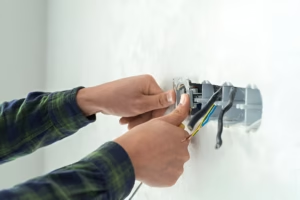Domestic Electrician Services Explained Simply
You’ve likely needed a house plumber at some point if you own your own home. But what does a home plumber really do? And why is it important to get a good one? This complete guide breaks down the work of a domestic electrician into easy-to-understand steps. It tells you when to call one and how to pick the best one for your needs.
What is a Domestic Electrician?
As the name suggests, a household electrician’s main job is to set up, manage, and fix electrical systems in homes. Their job is to make sure that houses are safe, up to code, and use energy efficiently.

Key Responsibilities:
- Putting in and changing out home wiring
- Putting in ceiling fans and light fixtures
- Putting in or changing the electricity plugs and switches
- Putting in new circuit switches and fuse boxes
- Doing checks for electricity safety
Why Hire a Domestic Electrician?
It can be dangerous to work with electricity. A qualified home electrician knows how to do the job properly and safely and has the right tools for the job.
Benefits of Hiring a Professional:
- Safety: Keeps you safe from things like electricity, fires, and shocks
- Compliance: Makes sure the work follows the rules in the area
- Expertise: Checks for problems correctly
- Insurance: A lot of the time, home insurance covers professional work.
Carpenter vs Electrician: Who to Call for Home Projects?
When deciding between a carpenter vs electrician. It’s important to know who handles what. Domestic electricians do all kinds of electrical work. While builders work with wood and build things. If your job includes both building and wiring like putting in hidden lights in a wooden ceiling or installing a spa setup you might even need a Hot Tub Electrician. For safety and effectiveness always talk to the right professional.
Common Services Offered by Domestic Electricians
1. Electrical Installations
Electricians set up all the wires and power in a home, whether it’s a new build or a renovation. This includes things like plugs, lights, and machines.
2. Fault Finding and Repairs
Your lights might be flashing, or your outlets might not be working. A household electrician can figure out what’s wrong and fix it.
3. Fuse Box and Consumer Unit Upgrades
Fuse boxes in older homes may not work as well as they used to. For better safety, electricians replace these with new customer units that have RCDs (residual current devices).
4. Lighting Installation
Electricians make sure that all kinds of lighting, from chandeliers to LED downlights, are set up safely and correctly, both inside and outside.
5. Electrical Inspections
Routine checks find problems that aren’t obvious and keep people safe. They are often needed when selling or buying a home.

Signs You Need a Domestic Electrician
- Lights that flicker or dim
- A lot of circuit breakers trip
- A burning smell coming from the plugs or switches
- Wiring that is too old (mostly in homes over 30 years old)
- We need more power sources or power ability.
How to Choose a Reliable Domestic Electrician
1. Check Licensing and Certifications
Make sure that the electrician has a license and insurance. On the island of Great Britain, look for NICEIC or NAPIT marks.
2. Read Reviews and Testimonials
Customer reviews on sites like Trustpilot and Google Reviews can show how good a service is and how reliable it is.
3. Ask for Quotes
Get more than one quote so you can compare prices and job scopes. Be wary of prices that seem too low.
4. Confirm Warranty and Guarantees
Trustworthy electricians will cover both the parts and the work they do.
5. Assess Communication and Professionalism
A good electrician will be able to explain problems and come up with good answers easily.
Conclusion
It doesn’t have to be hard to understand what a home electrician does. These trained workers make sure that the electrical systems in your home are safe, working well, and up to code. To get the job done right, you should always hire a licensed and trustworthy household electrician, whether you’re changing a fuse box or putting in new lights. A Commercial Electrician is the right person to call if you’re working on real estate for a business.
FAQs About Domestic Electricians
Do I need an electrician to replace a light fixture?
Yes. Some people try to do their installs, but it’s safer and often required by law to have a professional electrician do it.
How much does it cost to hire a domestic electrician?
Costs depend on where the job is and how hard it is. Hourly rates will be between £40 and £90, and parts will cost extra.
Are electrical inspections mandatory?
Most of the time, yes, especially when homes are being sold or rented. They make sure that the building meets current safety standards.
Can an electrician help with smart home devices?
Of course. A lot of home engineers set up and install smart home systems like security, lights, and heaters.